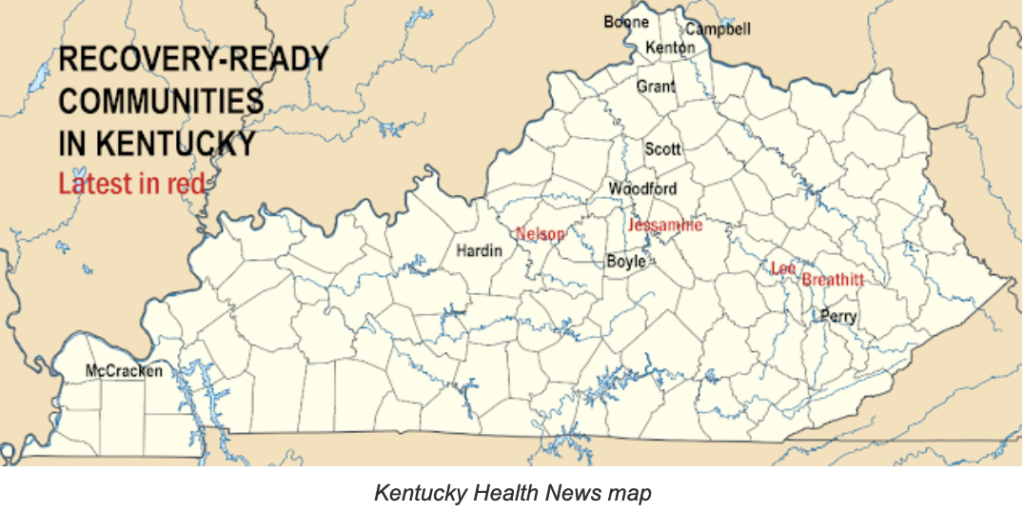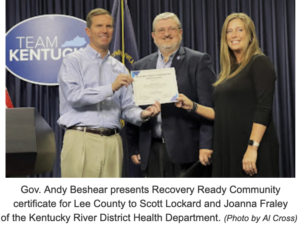Breathitt, Lee, Jessamine and Nelson counties are certified as Recovery Ready Communities, totaling 14 in effort’s 14 months

By Al Cross
Kentucky Health News
Four more Kentucky counties have been certified as Recovery Ready Communities, signaling that they have the services needed to help their residents recover from addiction. That brings the total to 14 out of 120; the program began 14 months ago. “We’ve got 106 to go,” Gov. Andy Beshear said.
 Breathitt, Jessamine, Lee and Nelson counties earned certification by showing they are able to provide addiction treatment to their 123,000 residents, according to Beshear, who presented Lee County’s certificate at a wide-ranging press conference Thursday.
Breathitt, Jessamine, Lee and Nelson counties earned certification by showing they are able to provide addiction treatment to their 123,000 residents, according to Beshear, who presented Lee County’s certificate at a wide-ranging press conference Thursday.
Scott Lockard, public-health director for the seven-county Kentucky River Disrrict Health Department, accepted Lee County’s certificate with Joann Fraley, who runs the department’s harm-reduction program, which includes a syringe exchange to prevent disease among intravenous drug users and steers them into treatment.
“The substance-use-disorder problem is the largest public-health issue that we are facing today in Eastern Kentucky and many parts of our commonwealth,” Lockard said.
Noting another major topic of Beshear’s press briefing, Lockard said, “These great economic-development announcements are fabulous, but each one of those factories needs people to work in them Second-chance employment is huge, and we have so many people who are being impacted by substance-use disorder, especially in our part of the state, in Eastern Kentucky.”
Lee County’s recovery program is based in The Hub, in the health department’s annex. “Our motto at the Hub is ‘We meet people where they are, but we do not leave them there,’ because it’s key that everyone who comes through our door is treated with respect and dignity.”
Lockard said the program has gotten more than 230 people into treatment, including three that morning. They were immediately transported to a treatment facility, Lockard said: “When they’re ready, we need to get them in there right then.”
When people leave residential treatment, The Hub offers them 11 support groups, links to second-chance employment, and “a ministry that fills the soul,” Lockard said. “You know, this emptiness left by drugs, we need to fill it with something else, and if we can get individuals back and show them that they have worth, that they have dignity, then we have the possibility to really help them to be gainful members of our society and fill some of these many jobs and just have a higher quality of life.”
Lockard said substance use must be approached as a disease. “We cannot incarcerate our way out of this problem.” He said The Hub includes a court diversion program for low-level drug offenders.
Immediately before the recovery discussion, Beshear and State Police Commissioner P.J. Burnett announced a statewide drug roundup of 206 suspects, mostly on trafficking charges. Burnett said another 50 suspects are still being sought.
To be certified as recovery-ready, a county must have peer-support services, mental-health treatment, addiction treatment, employment services and a stigma-free environment to encourage recovery. The program “encourages communities to provide transportation to and from employment services and job interviews, allowing Kentuckians to make positive changes in their lives while filling much-needed jobs and contributing to the commonwealth’s record-breaking economic growth,” a news release from Beshear’s office said.
The release included statements from representatives of the other counties.
“This is a huge step in continuing to move Breathitt County forward in applying for grants that will improve the lives of every person in our county,” said Breathitt County Circuit Court Clerk James Elliot Turner II. “We need to provide every opportunity for each person in Breathitt County to fulfill their potential. This is a win for our people.”
Shauna O’Nan, Jessamine County Health Department harm reduction director, said “There is no set path of recovery, but after going through this certification process, we are confident, as a community, that we will be able to meet people where they are on that path.”
In Nelson County, “Collaboration and community involvement underlie Nelson County’s efforts to provide recovery resources to its citizens,” the release said. Jessica Bickett, safe-communities specialist with the Lincoln Trail District Health Department, said “Nelson County has a strong network of community partners who are committed to supporting the recovery community.”
To learn more about the program and to apply for certification as a Recovery Ready Community, click here.
Paths to treatment
Information on how to obtain the life-saving drug naloxone, which is used to reverse an opioid overdose, can be found at that website as well as at FindNaloxoneNowKy.org and FindMentalHealthNowKy.org.
Visit the State Police website to find a post where those suffering from addiction can be paired with a local officer who will assist with locating an appropriate treatment program through KSP’s Angel Initiative.